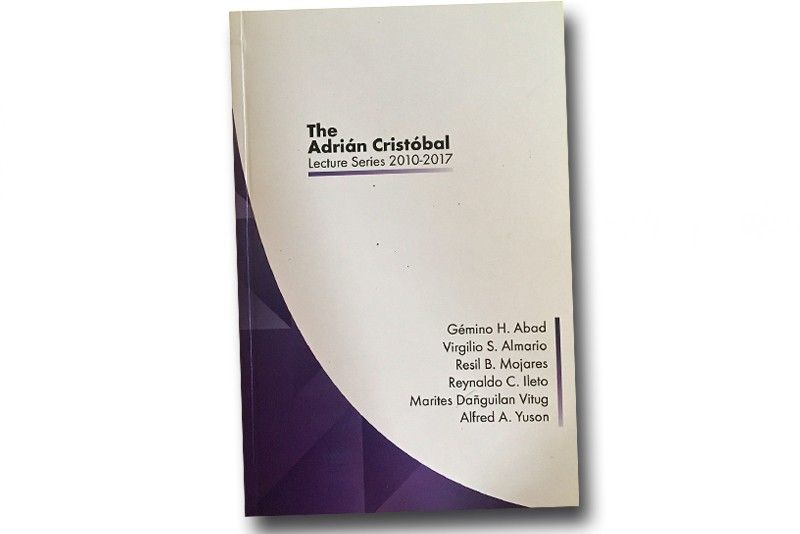Finding our paths through intellect and language


The Adrian Cristobal Lecture Series 2010-2017, edited by Celina S. Cristobal, published by Inyan Publishers Inc., was launched at AdMU’s Faura Hall AVR on Feb. 20, on the occasion of the delivery of the eighth lecture, by Soledad S. Reyes, titled “Past Meaning, Present Significance: Lessons from the Novel in the Year of the Dog.”
Reyes’ lecture will have to wait for the company of several others to form a sequel to this first book, which should have included the sixth lecture, delivered by Solita Monsod in 2016, but for the unavailability of her manuscript. Instead, the first essay in this collection is by the honoree himself.
Titled “The Revolutionary Tradition,” it was read by Cristobal in 2005 on the inaugural of the Plaridel Lectures “initiated by Samahan Plaridel — an organization founded by newsmen in 2003 — in cooperation with UMPIL”
“The talk about revolution in our interesting times makes us pause for some serious thought, mainly because it comes from privileged sectors like the military, acclaimed authors, and respected academicians and not from social malcontents.”
Thus starts Cristobal’s lecture, which covers many sub-topics, including the Oakwood incident, Rizal and his written works, the early ilustrados or intelligentsia, and what it takes to be a public intellectual — a term he finds redundant (“for I cannot conceive of a private intellectual”).
What follows is an important compilation of six lectures by illustrados or intellectuals, with each speaker focusing on his or her strands of intellect and interest at the time of delivery.
Celina Cristobal writes in her Preface:
“Gémino H. Abad was, hands-down, the favorite for the first lecture, having just received the Premio Feronia… National Artist Virgilio Almario accepted the challenge the following year, fueled by the controversy surrounding a ‘blasphemous’ art work and thus talked of what is vulgar in sex, art and religiosity. Two eminent scholars of Philippine history, and sources of groundbreaking ideas on nation and nationalism — Resil Mojares and Reynaldo Ileto — were always on the list and thankfully, they accepted based on their availability.
“… Marites Danguilan Vitug spoke on the realpolitik of elections and our real fears, and Alfred Yuson gave ‘fake news’ and other ‘miscommunications’ a dazzling treatise they do not deserve.”
Space constraints allow us to share only brief excerpts from each of the lectures except the last, portions of which were already featured here shortly after its delivery last year.
From the first in the series, titled “A Poetics of Writing” by Gémino H. Abad (2010):
“Only coincidentally, perhaps, does the poet and the social scientist meet from more or less a similar stance toward their subject, say, politics, or the human psyche. But the poet has no commitment to any theory, or at least, he feels free in regard to any theory, because to subscribe to a theory or critical fashion of his time is to be written under. … For the poet, in the final analysis, there’s no theory in that haunted and desperate craft called writing, but only an ever-changing poetics, for every writer must find his own path through language.”
From “Ang ‘Malaswa’: Sex, Sining at Relihiyosidad” by Virgilio S. Almario (2011):
“Sa huling lektura ni Adrian E. Cristobal na napakinggan ko ay may nagtanong sa kaniya. ‘Bakit hindi mahigitan ng mga nobelista ngayon ang kadakilaan ni Rizal?’ At ang sagot ni Adrian: ‘Dahil wala sa kanilang nakahandang magtaksil sa kanilang pamilya.’”
From “Andres Bonifacio & the Problem of Intellectuals” by Resil B. Mojares (2013):
“… (W)hat is evident is that Bonifacio — despite the reverses and tragedies of the revolution — had set into motion a process that became, and has become, irreversible. Today, he is an intellectual in the Gramscian sense of one who exercised the function of organizing, directing, educating, inspiring, and leading others. More important, he exercised this function not in behalf of a dominant social order but as an intellectual committed to opposing and transforming that order in behalf of a dominated people.
“He is not just ‘the man with a bolo.’ He is the people’s intellectual, the intellectual of the revolution.”
From “The Centennial of ‘Cacique Democracy’” by Reynaldo C. Ileto (2014):
“It should not come as a surprise that anticolonial nationalists and even some socialists with surnames like Alejandrino, Lava, Abad Santos, Constantino, Sison, Jalandoni, and of course Recto and many, many others, emerged from rural cacique families as defined by the Americans. If Adrian Cristobal had been around in 1914, knowing him and his work I’m sure the US administration would have stigimatized him as a cacique of the gente ilustrada, a troublemaker to be kept under surveillance.”
From “Democracy Beyond Elections” by Marites Danguilan Vitug (2016):
“Elections in the Philippines are regarded as the best sign and practice of democracy. While they are an institutionalized form of popular participation, elections alone do not a democracy make. There should be other ways to make democracy real and substantial, the kind that will work for the public good — away from the rule of the elites and the potency of the few.”
My lecture in February of last year is titled “Evolving Genres of the Written Word: ‘Fake News Fiction’ & Facebook Like(s).”
Limited copies of this publication are still available through Celina Cristobal, who may be reached via private message on Facebook.


















